November 2 - 8, 2014: Issue 187
Melbourne Cup 1914
The Melbourne Cup of 1914 was run on Tuesday 3rd of November, a mere two days after the first contingent of the First Australian Imperial Force left for Egypt on November 1st, 1914.
Although the year was dominated by news of war and then the declaration of war itself, with one incident on the 5th of August, when Australia fired its first shot in World War I at Fort Nepean in Victoria at the German merchant ship Pfalz as it was leaving Port Phillip Bay at 12.10am when news of involvement in the war had just reached the fort is believed to be the first shots fired in anger by British Empire forces during the war, there was, along with a sense of soberness, a will to ‘just carry on’;
THE MELBOURNE CUP AS USUAL
Yesterday's Melbourne Cup was run under unprecedented circumstances. At the same time as the riders were fighting for positions at the post, and at the turn, the grim desperate- battles for supremacy were proceeding throughout the Old World with undiminished vigor between .the Allies and the modern Huns. On the course, of the many thousands or people who witnesses to the race, practically all, for the time being were more anxious about which horse would catch the judge's eye than they were regarding the result of the desperate struggle, which, at the same moment, was being waged in France and Belgium. Perhaps, they did not even realise that it is to those brave soldiers who occupy the firing line (as-well as those who have given their lives for their country), and to those heroic men who man the mighty British fleet that they owe –their national existence, to say nothing about being able to witness the race for Australia's most important prize. The fact that the Cup could be run under prevailing circumstances is, indeed, one that should inspire in Australians the great debt we owe to Great Britain for her powerful protection. Sport as usual, under such appalling conditions. Even in England sport has almost been suspended, mostly on account of the participants and followers having taken up duty in the cause of the Empire. In France, there is no racing; in Belgium the courses upon which horses and riders vied for positions are now, perhaps, camping grounds for the brutal Prussians. Therefore, Australians can well recognise how fortunate they axe to be able to enjoy their sport and pastimes unhampered and with so much success. T hat they do realise England’s great protection there is no doubt, for the war has proved that we in Australia, will take second place to no other Dominion regarding loyalty to the Motherland. We are doing our share and are giving of our best — but we cannot do too much, and must be prepared to make even greater sacrifices than we are at present prepared to make should the necessity arise. It is well that we can have our pleasures, notwithstanding the cloud at present covering over Europe. Though, of course, it would not be wise to over do it, still sport as usual, as well as business as usual, should be the maxims of all in Australia. Let us have our pastimes; let us have our pleasures; let us do our duty to Australia and to our Motherland and keep matters as normal as possible during the crisis, and, above all, let us if necessity arises, give our last drop of blood and our last penny to assist a Motherland which has made it possible for us to exist. We are not assisting England; it is England that is assisting us to keep our nationhood. If England goes down, Australia as a nation will be no more — it will be ruled by the modern Huns. However, there is not much fear of that. With such magnificent and spontaneous unity throughout our great Empire, and with our Allies fighting by our side, there can only be one result — the crushing and humbling of the arrogant Prussians. May that result be achieved long before the Melbourne Cup next occupies the attention of Australians.THE MELBOURNE CUP AS USUAL. (1914, November 4).National Advocate (Bathurst, NSW : 1889 - 1954), p. 2. Retrieved fromhttp://nla.gov.au/nla.news-article157938212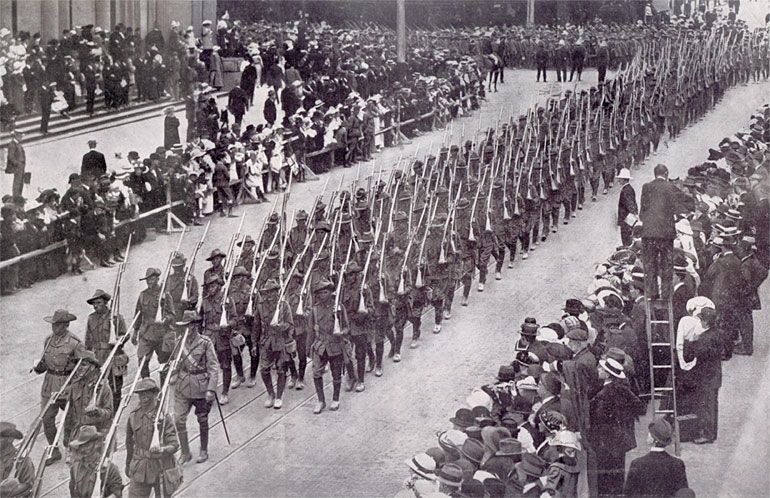
The 16th Battalion (AIF) marching through Melbourne in 1914
The First Melbourne Cup
From Port Darwin to the Derwent men's minds are, despite the war, occupied with the Melbourne Cup. The chief topic of conversation is the winner of the Cup yet to be run. There is a glamour round this historic race that can only be explained on the ground that every Australian dearly loves a good horse. To the old-timer the Cup is a precious storehouse of pleasant memories. Recollection goes back to the day when Carbine, the idol of the public, carried 10 st.5 lb. to victory in 1890, when the stakes totalled £13,230. he recalls, too, Banker's win in 1863, when the Melbourne Cup stake amounted to £510 ! Banker only carried 5 st. 4 lb. Nimblefoot is remembered because of the price he started at 100 to l, the longest odds a Melbourne Cup winner has ever carried. In contrast, Revenue won at 7 to 4 in 1901. If the old timer cares to, he will tell how Archer won the Cup two years in succession, carrying 10 st. 1 lb. in 1862. Grand Flaneur, who won in 1880, afterwards sired two Cup winners — Bravo (1889) and Patron (189-1). The fund of turf reminiscences is inexhaustible. First Melbourne Cup, 1861.Of 20 sovs., 10 sovs. forfeit, or 5 sovs. If declared, with 200 sovs. added by the Victoria Turf Club. 2 miles. Mr. E. de Mestre's b h ARCHER, .5 yrs., 9.7 (Cutts), Mr. J. Henderson's br h MORMON,6 yrs., 10.1 (Simpson) Mr. Wm. Pearson's bile g PRINCE, aged, 8.0 (Bishop). Also started: Mr. B. Warby's br c Antonelli, 3 yrs., 6.7 (Cowan) ; Mr. T. Bavin's gr g Flatcatcher, aged, 9.3 (Perkins) ; Mr. G. Watson's blk g The Moor, aged, 8.12 (Waldock) ; Mr. J. Henderson's ns. ch m Despatch, aged, 8.9 (Morrison) ; Mr. E. de Mestre's b g Inheritor, aged, 8.7 (McCabe) ; Mr. Coldham's br m Twilight, aged, 7.12 (Haynes) ; Mr. J. Coldham's b f Grey Dawn, 4 yrs., 7.12(Yeend) ;? Mr. T. Bavin's b rc Moscow, 4yrs., 7.12 ; Mr. W. C. Ynille's gr g Toryboy, 4 yrs., 7.11 (Cooke) ; Mr. J. Hume's blk m Black Bess, 6 yrs., 7.11 (Monaghan) ; Mr. J. Henderson ns. f Medora, 3yrs., 7.0 (J. Henderson) ; Mr. J. Henderson ns. ch g Sorcerer, 3 yrs., 6.9(Hughes) ; Mr. W. C. Yuille's br c Eagle Plume, 3 yrs., 6.7 (Lankey) ; Mr. Cole's rn g Fireaway, 3 yrs., 6.6 (Howard) ; Mr.E. Coleman's br f Lucy Ashton, 3 yrs., 6.4(Davis).
Eagle Plume weighed out and mounted, but after taking his preliminary canter was returned to the saddling paddock and sent home.
Archer, a magnificent bright bay, standing 6.3, by William Tell — Maid of the Oaks, came with a great reputation from Sydney, but, notwithstanding his size and condition, he failed to inspire general confidence, as it was thought the Victorian champion, Mormon, was more than a match for the visitor. The rival merits of the formidable pair were eagerly discussed, but, the confidence of the Victorians increasing as the hour of starting arrived, the Sydney party ceased to support their horse, and Mormon, Despatch, and Toryboy appeared to be general favourites. Betting: 7 to 2 v. Mormon, 4 to 1, Despatch, 9 to 2 Toryboy, 5 to 1 Archer,8 to 1 Inheritor and Flatcatcher, 12 to 1others.
Before starting, Twilight bolted, and went all round the course in fine style before she could be pulled up. After one false start the horses got well away together, Flatcatcher taking the lead, Archer next, and then came Mormon, Medora, Prince, and Despatch, the others in a ruck. As they rounded the turn into the straight, Flatcatcher was two lengths ahead, of Archer, and the latter a length ahead of the field. At this point a lamentable accident occurred through Twilight, Medora and Despatch falling, and of the three only Twilight arose, her rider sticking bravely to the reins. She, however, eventually got loose, and careered away from the course. While the spectators hastily removed the injured jockeys and horses, the remaining fourteen runners dashed past the stand at a tremendous rate, the front rank being composed of Mormon, Archer, Fireaway and Antonelli. At the river-side the two Sydney horses, Archer and Inheritor, were in front, but the latter soon beat a retreat, and the light-weighted Antonelli became the immediate follower of the great Sydney crack, who, still forcing the pace past the abattoirs, left a spread-eagled field behind him contending for place honours. As the New South Wales hero came on well away from his horses, Mormon drew gradually forward, and Toryboy fell back beaten. On entering the straight Antonelli hung out signals of distress, and Prince supplanted him. The race was virtually over a quarter of a mile from home, the Sydney horse coming in at last an easy winner by several lengths, Mormon second, Prince third, and Antonelli close up. Time, 3 min. 52 sec. The First Melbourne Cup. (1914, October 29).Public Opinion(Melbourne, Vic. : 1914 - 1915), p. 5. Retrieved from http://nla.gov.au/nla.news-article153583539
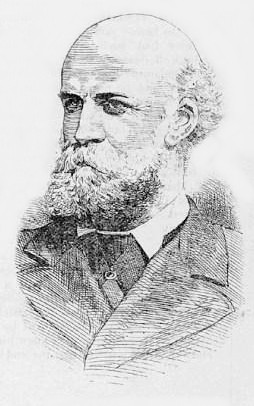 Etienne de Mestre (1832–1916), a 19th-century trainer of Thoroughbred racehorses, was Australia's first outstanding racehorse trainer. In his 30 year career he experienced all the highs and the lows of the turf in a career which ended with him dependent on donations from racing friends.
Etienne de Mestre (1832–1916), a 19th-century trainer of Thoroughbred racehorses, was Australia's first outstanding racehorse trainer. In his 30 year career he experienced all the highs and the lows of the turf in a career which ended with him dependent on donations from racing friends.With the five wins de Mestre achieved in the Cup's first 18 years, he held the record for training the most Melbourne Cup winners for nearly 100 years. De Mestre won the first two Melbourne Cups with Archer in 1861 and 1862, and later trained a further three winners: Tim Whiffler (1867); Chester (1877); and Calamia (1878). He set a training record for Melbourne Cup winners which was finally broken by Bart Cummings in 1977.
Etienne was born in George Street, Sydney[2] on 9 April 1832 in his parent's home, on the same block of land backing onto the Tank Stream that his mother had been born 30 years earlier. He was the third and youngest son of the Frenchman Prosper de Mestre (1793–1844), a Sydney merchant, and Sydney-born Mary Ann Black (1801–1861). Mary Ann was born in Sydney on 1 October 1801. Her mother was the former convict Mary Hyde (1779–1864) who in 1855 took the Commissioners of City of Sydney to the House of Lords and won. Her father was Captain John Black(1788–1802), a ship's officer and a privateer (state-sanctioned pirate). Mary Ann was their second child, and only daughter. Her father died in 1802 when his ship the Fly was lost at sea with all hands.
De MESTRE - Etienne Livingstone by Unknown - Gooreen collection
Mary Ann Black. (2014, August 21). In Wikipedia, The Free Encyclopedia. Retrieved 13:15, fromhttp://en.wikipedia.org/w/index.php?title=Mary_Ann_Black&oldid=622250827
Etienne L. de Mestre. (2014, September 19). In Wikipedia, The Free Encyclopedia. Retrieved fromhttp://en.wikipedia.org/w/index.php?title=Etienne_L._de_Mestre&oldid=626157624
1914 Melbourne Cup Winner:
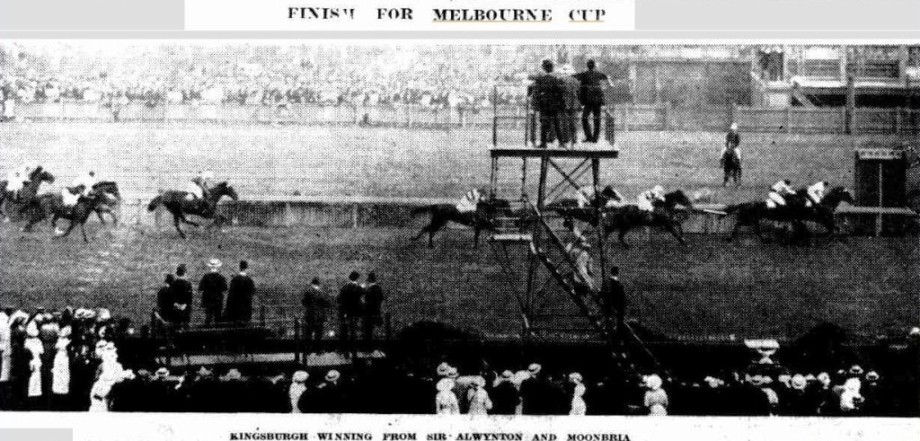
FINISH FOR MELBOURNE CUP
And some interesting insights on the 1914 Melbourne Cup and its times:
MELBOURNE CUP PICTURES.
The Melbourne Cup is to be run at Flemington on Tuesday. Nineteen hours later the people of Sydney will be afforded an opportunity of witnessing the race re-run. This means that the pictures will be taken, developed, carried a distance of over 500 miles, and screened in the time mentioned— surely going some. To bring about this result, the Australasian Films. Ltd., have arranged for the developing of the films on the express during its run to Sydney from the Southern capital. They will be exhibited at the Crystal Palace on Wednesday. West's directors have made arrangements for the screening of the Cup at both the Glaciarium and Olympia on Wednesday evening.MELBOURNE CUP PICTURES. (1914, November 1). Sunday Times (Sydney, NSW : 1895 - 1930), p. 16. Retrieved fromhttp://nla.gov.au/nla.news-article126756153
MELBOUNE CUP WON BY KINGSBURGH. In Record Time.
The Melbourne Cup was run at Flemington on Tuesday in fine weather. The race resulted:—
K. S. MacLeod's Kingsburgh, by Wallace—Alexandra, 6st 121b (G. Meddick), J. S. Agnew's Sir Alwynton, by St. Alwyne—Miss Simmington, . 8st 3lb i A. Wood) 2E. J. Watt's br.h. Moonbria, byMerriwee—La Notte, 7st 3lb (W: Callinan) 3 . Other starters: Cagou, Lilyveil, Uncle Sam, Ratlilea, Posinatus, St..Japasa, Sir Solo, Ulva's Isle, Eltham,Wassail, Sylvanmore, Eubulus, OwenRoe, Indiscretion, Gladwyn, St. Carwynne, Calamus, Carlita, Giru, Naxberry, Hush Money, Burrabadeen, Allingamite, Defence, Aristaeus.
Betting: 5 to 1 St. Carwyne, G to1 Ulva's', Tsle, 7 to 1 Uncle Sam, 12 to l Lilyveil and Sylvanmore, 16 to1 Oarlita, 20 to* 1 Kingsburgh, Posinatus, St. Spasa, 25 to ,1 Aristaeus, Sir Alwynton, and Moonbria, to lGiru and Eltham, 50 to 1 Cagou, SirSolo, Owen Roe, Hush Money, Indiscretion, Burrabadeen, and Defence,100 to 1 Ratlilea, Allingamite, 200 to1 Eubulus, Calamus, and Wassail.
Eltham jumped off in front of Kingsburg and Posinatus, but at the end of the first furlong Posinatus was in command from Indiscretion, OwenRoe, and Sir Alwynton. When they reached the two furlongs post, Cagou came through, followed by Posinaths, Sir Solo, and Giru. The last named showed the way past the judge's box, with Posinatus, Indiscretion, Sir Solo, and Caiiita, with UI va's Isle last. Cagou and Posinatus turned out of the straight together; four lengths from Indiscretion, Giru, and Carlita, and at the bridge Cagou had a slight advantage from Posinatus, who was succeeded by: Giru, Indiscretion, and Carlita, with Ratlilea last. Opening up the back stretch Kingstiuvgh and Giruran through, and were followed by Posinatus, Lilyveil, and Uncle Sam, Kingsburgh came past the sheds and round the turn, with Uncle Sam, Ulva's Isle, and Sir Alwynton in pursuit. Sir Alwynton turned for home with a slight advantage from Kingsburgh, Ulva's Isle, Moonbria, and Carlita. At the distance Sir Alwynton was just in front of Kingsburgh, who was followed by St. Carwynne, Moonbria, and Ulva's Isle. Kingsburgh took charge at the half distance, and coming on, beat Sir Alwynton by a neck, with Moonbria a length and a half away third. St. Canvynne was fourth, Ulva's Isle fifth, and Uncle Sam sixth, the last being Naxbery. Time, 3min. 26sec.
The time was 1 ¾ sec. better than the previous record. MELBOURNE CUP. (1914, November 6). Forbes Advocate(NSW : 1911 - 1921), p. 1. Retrieved from http://nla.gov.au/nla.news-article100291553
Kingsburgh also known as L. K. S. Mackinnon, apparently won more then 14,000 pounds in bets. He was later renamed in 1936 to Kingsburgh after his owner. Kingsburgh with jockey George Meddick won the Cup in a time of 3:26:00, trained by Isaac Foulsham and owner L. K. S. Mackinnon went home with winnings totalling of 9,890 gold sovereigns.
AFTER THE CUP
MELBOURNE, Tuesday.
Meddick, who rode the Cup winner is a Sydney lad, apprenticed to W.Kelso. and is only 18 years of age. He said he had to ride hard all the way. Ettershank, who rode Uncle Sam, said the horse broke down after 1 ½ miles; otherwise, he would have won. AFTER THE CUP. (1914, November 4). National Advocate(Bathurst, NSW : 1889 - 1954), p. 2. Retrieved from http://nla.gov.au/nla.news-article157938224
The Melbourne Cup.
MELBOURNE, Tuesday.
'I did not expect to win,' said George Meddick modestly. He is a Newcastle lad, and has won 22 races. 'I hung about fifth most of the way,' he added. At the abattoirs I started to move up and coming round the turn I got the lead and kept It. I had to ride hard all the way, and the horse cut It out In fair style ' The Melbourne Cup. (1914, November 6). The North Western Courier (Narrabri, NSW : 1913 - 1954), p. 5. Retrieved from http://nla.gov.au/nla.news-article141667482
ASCOT RACES - GEORGE MEDDICK'S SUCCESS
SYDNEY. . Wednesday.
George Meddick continued his wonderful run by piloting three more winners—Lar Web, Judith and Enibra and Pterodactyl—at Ascot today. Meddiek has won at every meeting since he crossed over to the ponies. ASCOT RACES. (1926, July 15). Northern Star (Lismore, NSW : 1876 - 1954), p. 2. Retrieved from http://nla.gov.au/nla.news-article93558377
1914 in Australia - Timeline lead into Spring Melbourne Cup
• 5 August – Australia fires its first shot in World War I at Fort Nepean in Victoria. The German merchant ship Pfalz was leaving Port Phillip Bay at 12.10am when news of involvement in the war had just reached the fort. The battery fired shots across its bows forcing the ship to surrender. This is believed to be the first shots fired in anger by British Empire forces during the war.
• 10 August – Recruiting begins for the First Australian Imperial Force. Australia had offered a force of 20,000 troops.
• 18 August – The Australian Naval and Military Expeditionary Force of 1500 men leaves Sydney to capture German New Guinea.
• 5 September – The Australian Labor Party led by Andrew Fisher wins the Federal election of 1914 winning 42 out of 75 seats in the Australian House of Representatives and 31 out of 36 seats in the Australian Senate.
• 9 September – The light cruiser HMAS Melbourne captures the German radio station in Nauru.
• 11 September – Australian troops land in German New Guinea.
• 13 September – Rabaul occupied.
• 14 September – The Australian submarine HMAS AE1 lost with all 35 men while patrolling New Britain.
• 17 September – The acting governor of German New Guinea surrenders.
• 29 October – The War Precautions Act 1914, which gave the Government of Australia special powers for the duration of World War I and for six months afterwards, was passed by the Parliament of Australia.
1914 in Australia. (2014, September 2). In Wikipedia, The Free Encyclopedia. Retrieved from http://en.wikipedia.org/w/index.php?title=1914_in_Australia&oldid=623833883
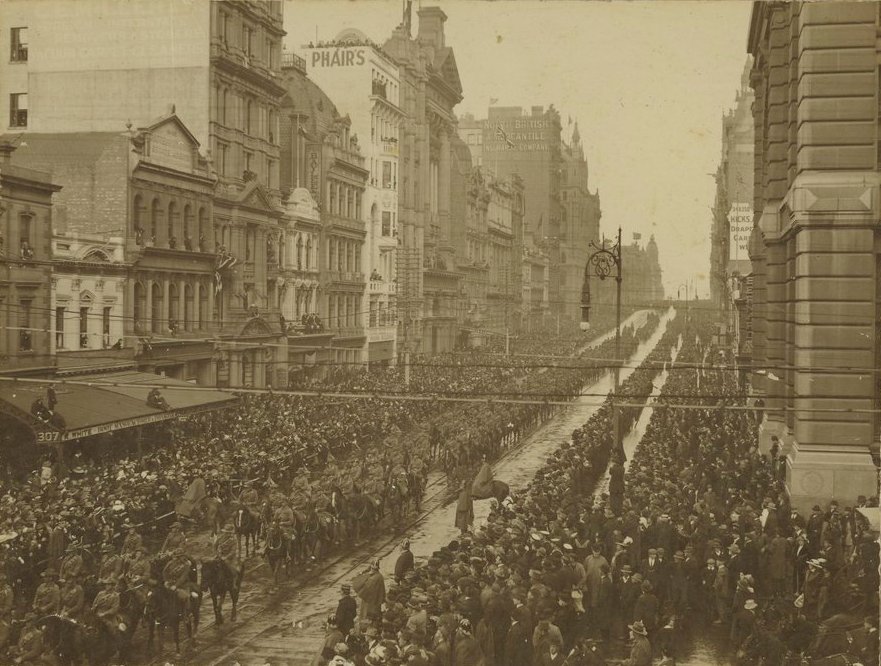
1st. Australian Division leaving Melbourne 1914, State Library of Victoria Picture: 302133
UNPUBLISHED POEM BY GORDON.
Under date Fern Tree, November 4, Mr A. N. Hopkins writes us :- Being one of the many admirers of Gordon's works, I have taken the trouble at different times to collect information regarding him. Some time ago a South Australian friend, who loved Gordon with a fervency equalled by myself, let me copy the verses below, and, which, as far as I know, have never yet been published. My friend got them fromMr William Trainor, who at present resides in or near Melbourne, and who, as is well known to south-eastern South Australians, was one of Gordon's " ancient boon companions," and with whom Gordon left his manuscripts. As regards the authenticity of the verses I have no doubt, and any discrepancies are far more likely to have been mine (in the hurry of copying) than the author's.
The Mr William Trainor referred to was in Gordon's time a well-known steeple- chase rider in the western districts of Victoria and also in South Australia. He visited Launceston last February, when it will be remembered his son, Gordon Trainor, while riding Steelbone at the T.T.O. summer meeting at Mowbray, sustained severe injuries from a fall on the course, from the effects of which, however, he thoroughly recovered before leaving the city. The poem forwarded by Mr Hopkins is as follows:
VERSES INSPIRED BY MY OLD BLACK PIPE.
Ah, many a sport old Homer names
By Achilles held at his little games
On the banks of the swift Seamander.
And Pindar sings the Olympian deeds,
Of the Ivory car, and the milk white steeds,
Of Catallus and Lysander.
How clouds of dust aloft were spurned,
By the wheels that grazed the gods as they turned,
'Till the red sparks flickered redly,
How the strains of mingled mirth and fury
That swelled in the chant of the Morituri
Proclaimed when the sports were deadly.
Ah, little we cared for classic lore,
When Greek was a task and Latin a bore,
In school days that are deemed of yore,
And who will venture to chide us
If better we loved the playfield green,
And the blackthorn hedge that served as a screen,
In the mills that settled our boyish spleen,
From the tutor's eyes to hide us ?
Who envies the bygone days of old,
They never were half as good at we're told,
Their loss is not worth bewailing.
We have seen young Camel's slashing stride,
And Archer's rush, and Mormon's pride,
And the deer-like bound of Ingleside
At five feet three of a paling.
We've seen how the sides of Falcon bled,
And the hopes of Arumas's backers fled
When the Rose of Denmark shot ahead
And never again they caught her.
How false were the shouts of Barwon' first,
When she came from the distance home with a burst,
And the favourite's friends devoutly cursed
Old Premier's gamest daughter.
What cheers for King Alfred's white-faced son
Were heard when the western chase was done,
And the judge's verdict given.
While Vandyke fell in the beaten ranks,
And the red spots showed on the mare's great flanks
How vainly the steel was driven.
And with anxious longing we wait the day
When the prads must strip for the homing fray,
To be criticised in rotation.
But to spot the winner we will not try,
For a mist obscures our mental eye,
And we have not the power of prophecy,
Nor the spirit of divination.
Yet, in fancy's glass we may scan the course,
And hear the bookmakers' challenge hoarse,
The odds incessantly dinning.
We may watch the starter's signal fall,
And the nags may picture one and all,
For the Cup in a cluster running.
And mark, as they sweep before the stand,
How Ebor in going well in hand,
And Banker is pulling double.
How longer each moment grows the tail,
As one by one the outsiders fail,
And get into grief and trouble.
How Trainor pulls out of Waldock's track,
And Morison steadies the Caulfield crack;
While up on the right comes the rose and black
Like an eagle that scents the plunder -
How round the turn they jostle and crush,
And Simpson clears his whip for a rush,
And then on the crowd comes a loll and a hush,
And then a roar like thunder.
And when Beaufort collars the western pet,
Then "Greek meets Greek" unconquered yet,
And the tug-of-war commences,
As stride for stride, with the stroke of one -
Like greyhounds running with couples on -
Together they fly their fences.
There's Vales and Rhyming Richard, too,
Can tell much better than I or you
What nags are likely the trick to do;
Nor will I their judgment sneer at.
If the gift of second sight were mine,
I'd make my fortune, and then I'd shine
But I haven't got it, and so I'll sign
" Qui meruit palmam ferat."
UNPUBLISHED POEM BY GORDON. (1891, November 17).Launceston Examiner (Tas. : 1842 - 1899), p. 3. Retrieved fromhttp://nla.gov.au/nla.news-article39582163
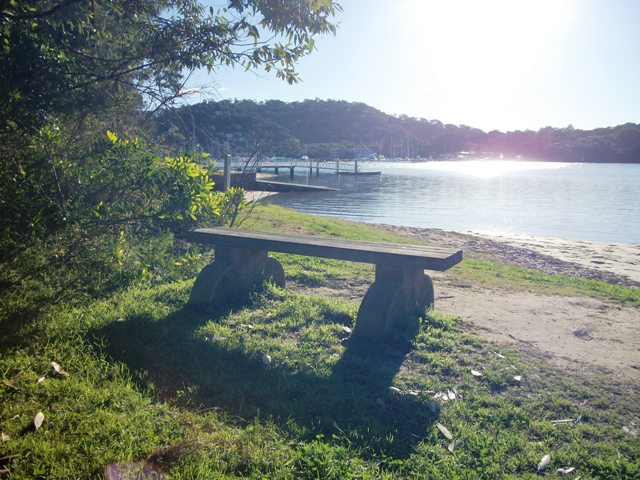
Park Bench Philosophers
We welcome contributions from all Pittwater residents in the form of anecdotes, memories, stories, poems or even matters you'd like to see addressed or changed in our area.
If you have something you'd like to share, something you'd like to start a discussion about, or even just a poem or story from yesterday or today we want to hear from you.
Contact us at: pittwateronlinenews@live.com.au
Please note that Pittwater Online News does not endorse any of the content of works contributed. Articles which contain swearing or may offend others will not be accepted. Please note that all works are posted unedited; you are the author, this isyour page. Word Limit: 2000.